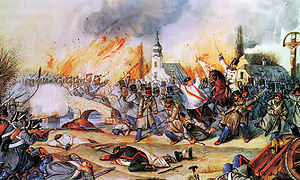Battle of Kápolna
| Battle of Kápolna | |||||||
|---|---|---|---|---|---|---|---|
| Part of the Hungarian Revolution of 1848 | |||||||
 Painting of The Battle of Kápolna by Mór Than |
|||||||
|
|||||||
| Belligerents | |||||||
|
|
|
||||||
| Commanders and leaders | |||||||
|
|
|
||||||
| Strength | |||||||
| 36,000 men 136 cannon |
30,000 men 165 cannon |
||||||
The Battle of Kápolna was a battle in the Hungarian Revolution of 1848, fought on 26 and 27 February 1849. The battle ended with Austrian victory and influenced the politics of central Europe: Franz Joseph I announced the March Constitution of Austria on 4 March 1849.
László Teleki sent Henryk Dembiński, the Supreme Commander of the Polish November uprising, from Paris to the Kingdom of Hungary. Lajos Kossuth knew Dembiński well after his Lithuanian retreat.
Dembiński's appointment was misguided, because he was introverted, short-tempered, and distrustful. The Hungarian commanding officers did not like it. Dembiński had an argument with Mór Perczel, stood down György Klapka, and later had an argument with Artúr Görgey.
Dembiński’s plans were to fight the final battle at Mezőkövesd and Eger, but before this to attack the Austrian army at Szolnok. He was so obsessive about his plans that he even refused to attack Franz Schlik, even though Shlik was completely isolated. Dembiński's explanation was that if he did, Winfisch-Grätz still wanted control in Buda, which meant that the battle plans for Mezőkövesd and Eger were null and void. Dembiński stuck to his plan and drew back one of his legions from Pétervására when Klapka wanted to attack Schlik on 24 February.
...
Wikipedia
